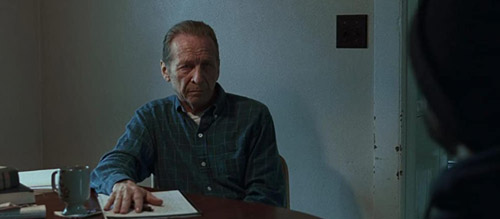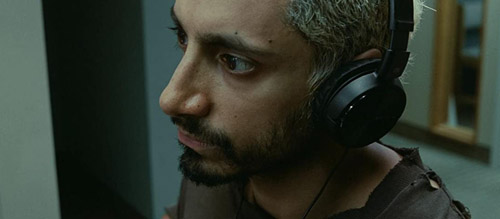Sound of Metal (2021)
Director: Darius Marder
Screenwriters: Darius Marder, Abraham Marder, Derek Cianfrance
Starring: Riz Ahmed, Paul Raci, Olivia Cooke, Mathieu Amalric, Chelsea Lee
It may seem cliché, but the hardest moments in our lives are the ones that become our most defining. Although typically cinema would have us believe differently, these moments rarely happen all at once; they happen sporadically over time, morphing us, sometimes slightly, sometimes significantly, into new people with each passing day. As we see in Darius Marder’s latest film, Sound of Metal, it’s instinctive to want to cling on to the past, to resist change, and bargain to remain in the grooves we forge for ourselves. However, life continues to move on in the most challenging and uncompromising of ways, dragging us behind it whether we like it or not.
For Ruben Stone (Riz Ahmed), a bleach-blonde drummer in a touring hardcore metal band, life exists in a delicate balance. Submerged in a nomadic lifestyle with his girlfriend and bandmate Lou (Oliva Cooke), Ruben appears to be a sure-footed and dependable soul, committed to maintaining the pair’s isolated existence: he wakes before her, makes the coffee, rustles up healthy smoothies, distracts her from her urges to self-harm, drives them from gig to gig and puts aside time for them to dance together to old love songs. Their lifestyle seems rehearsed and well maintained, but everything flips on its head when Ruben suddenly loses his hearing. Experiencing almost complete hearing loss and unable to communicate with Lou, with a job dependent on an ability to hear music, the outward calmness Ruben projects with such confidence suddenly begins to crack.
Fearing that Ruben’s mounting panic and anger will jeopardise his four-year sobriety, Lou scrambles to find a group that can cater to his hearing loss. Upon arriving at a rural church-funded rehab centre for the deaf, the pair meet Joe (Paul Raci), the tough but fair group leader, who offers Ruben a bed and a chance to learn sign language on the condition that he says goodbye to Lou, surrenders his keys and phone, and is willingly cut off from all outside interference to best commit to the program. Ruben resists at first, wanting to find a way to continue on tour with Lou, but eventually snaps and lashes out, forcing Lou to make the decision for him: ‘You hurt yourself; you hurt me,’ she says before climbing in a cab headed to the airport.
‘We aren’t looking for a way to fix this’, Joe says to Ruben, pointing to his ears when Ruben tells him about a costly implant surgery he’s planning on getting that might restore his ability to hear in some way. ‘We’re looking for a way to fix this,’ Joe continues, pointing to his head, outlining the importance that Ruben should come to terms with his situation before he considers anything else. Ruben’s first task: ‘Learn how to be deaf’. Joe enrols Ruben in ASL classes, signs him up to help out in a class for deaf children, and encourages him to take some time alone to sit, write and come to terms with his emotions. Although Ruben appears to forge new grooves for himself among the deaf community, he resists total commitment and looks, like an addict hustling for their next hit, for ways to get back to Lou and his old life at every opportunity.

Sound of Metal’s most obvious achievement lies in its glorious and affecting use of sound design. The film’s commitment to allowing its audience to experience the world precisely as Ruben does is nothing short of a masterpiece in technical finesse. When Ruben first experiences hearing loss, we are plunged into an all-encompassing and piercing static silence that feels profoundly terrifying. When Lou attempts to speak, we hear her voice as dull, muffled, and indistinguishable as though submerged underwater, which encapsulates the isolated panic we feel radiating from Ruben. The film shifts steadily across the spectrum of sound, amplifying every silence and every noise from the crisp first drip of a warming coffee machine to the sound of a child’s hand reverberating against a metal slide. Marder refuses to take us by the hand and lead us comfortably through this story; he leaves audiences who don’t know ASL to decipher extensive conversations made entirely through sign language without subtitles, which primarily enables us to experience Ruben’s isolation, but most significantly forces us to check our privilege.
Marching to the beat of his own drum at the centre of the film is Riz Ahmed, entirely and utterly dazzling from the moment he arrives on screen, half-naked and dripping in sweat behind a worn-in drum kit in the thick of an intense show. Time and time again, Ahmed brings flavour and intricate thought to each of his characters, elevating his performance with each on-screen turn. He approaches Ruben with restraint and strident self-control rather than the brash and abrasive tones you’d expect from a punk drummer with a background of heroin addiction. Ahmed plays this character softly, drawing a depth of warmth out of Ruben, defining him through low-key actions and serenity.
However, there is fire bubbling under Ruben’s surface, waiting to engulf him. We see this unpredictability peek out at his edges as he attempts, with everything he has, to keep a lid on his panic. The abject horror he experiences losing his hearing and his life with Lou on the road filters out through uneasy displays of microaggression: smashing a doughnut, writing his name in large, aggressive letters on a classroom whiteboard, screaming in frustration, consuming a worrying intake of cigarettes. Ahmed builds this tension steadily, occasionally letting loose before he pulls Ruben back together so he can continue on his impossible journey back to his former life. Paul Raci, too, is a phenomenon, pouring heartache, strength and conviction into every scene. After a difficult conversation with Ruben, he physically breathes out a devastating well of restrained emotion in one shaky sigh, saying more in mere seconds than any length of dialogue ever could.
Costume designer Megan Stark Evans completely encompasses a distinct grunge and post-punk style, manifesting rebellion, aggression and defiance through Ruben’s wardrobe. Her references to punk, metal and hardcore are well-researched and authentic, completely embodying the alternative scene’s lifestyle and outlook. Olivia Cooke is unrecognisable, serving a young Stevie Nicks with an anarchist edge. Riz Ahmed’s many hand-drawn tattoos tell tales of Ruben’s history – the words, ‘please kill me’ scrawled across his chest speak the loudest. There’s a certain grit to Daniël Bouquet’s cinematography that compliments the tone of Evens’ work. Paul Raci’s Joe is framed with light in contrast to Ruben, who appears almost shadowed in darkness.
For most, Sound of Metal will be a film about becoming deaf, which, stripped to the bare bones, it completely is. It does, however, feel wrong to suggest that this is the summation of all its parts. Sound of Metal is a mere glimpse at a character who has already lived through a great deal; it doesn’t attempt to dilute its issues down into a two-hour run time or sugar-coat complex themes into easily digestible plot. Ruben’s tale is also a story of addiction and coping with the punches life doles out; although its central narrative arc is reflective of a unique group, the overall story feels entirely universal, precisely capturing the feeling of clutching on and longing to return to a time before life threw its absolute worst at you. Sound of Metal is a triumph for Riz Ahmed, who has been steadily rising to the top, choosing unique roles and deservedly picking up esteem and awards attention for a while now. His performance is a testament to his talent, for he doesn’t deliver a single note out of place.
24/24


